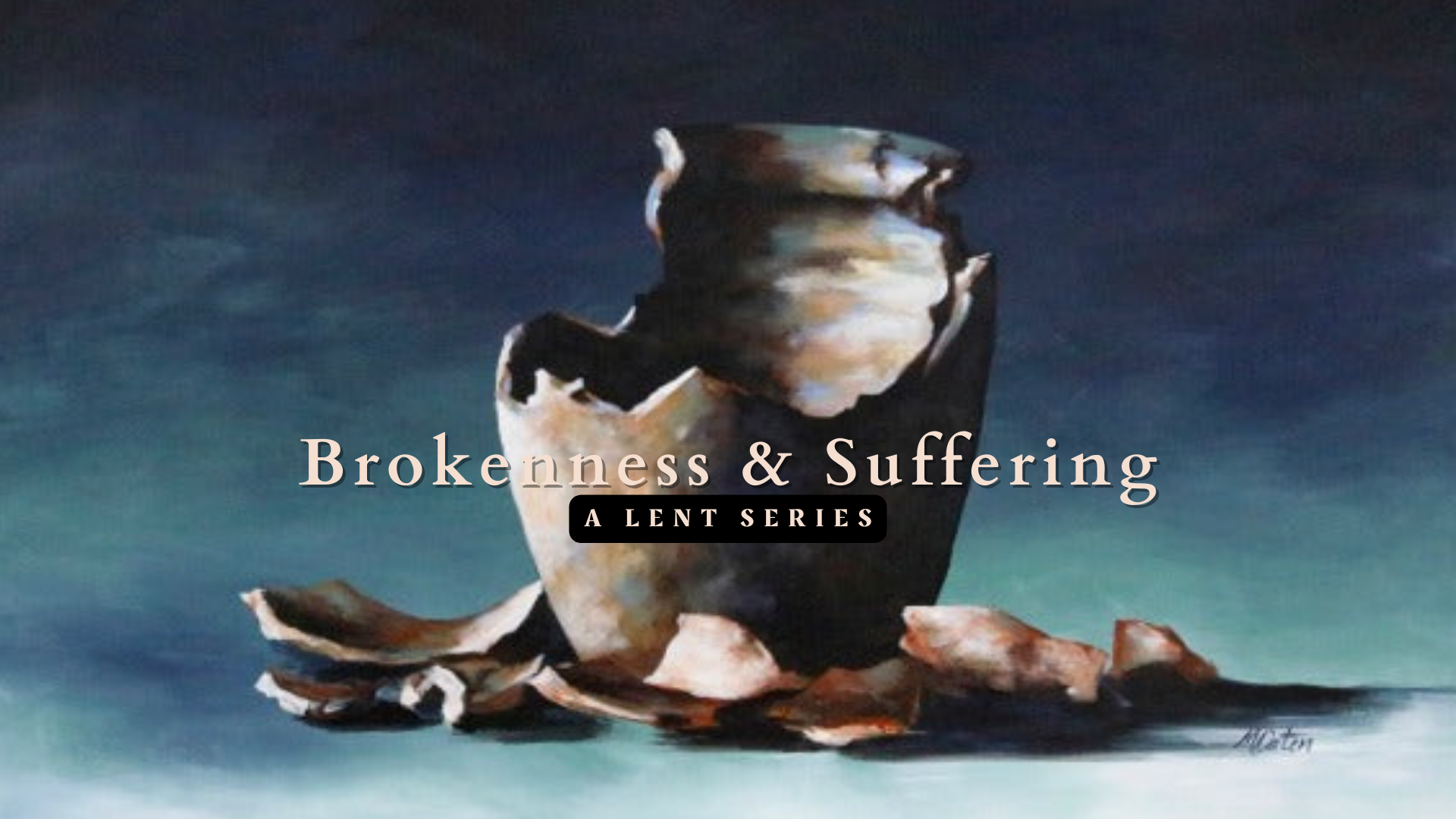
Recent
Sermons
Brokenness And Suffering: Lifelong Covenant
Pastor Andrew continues the sermon series titled “Brokenness and Suffering”. In this series, Andrew focuses on how Jesus suffered for us. He then addresses an aspect of human sexuality, and the suffering and brokenness that comes with sexual immorality. See the notes below for more.
Sermon begins at about 25 minutes
Audio:
You can listen to the sermon below, or you can subscribe to our Celebrators Podcast wherever you listen.
Things To Remember:
Jesus suffered by being betrayed by those closest to him (Judas, Peter, the other disciples).
In Matthew 19:4-6 we Jesus referencing Genesis 1 & 2 and reinforcing that marriage was two persons becoming 'one flesh' which is biblically understood as a lifelong covenant.
Biblical Ideal for Human Sexuality: Lifelong Covenant
Challenge #1: Divorce
“Divorcing a spouse in a legal way just because you’re not happy in your marriage or because you want to marry someone else is following a law but failing to love.” (Bill Gaultiere paraphrase of Matthew 5:32 in Jesus Greatest Teaching)
Jesus discourages a focus on rationale for divorce and encourages God's ideal of marriage being a lifelong covenant.
Biblically being 'in love' is not the requirement for being married, rather the covenant relationship is a place to learn to love.
God hates divorce, but he does not hate divorced people. He hates the pain divorce causes (not just for the two going through divorce but maybe especially for the children involved).
Hard heartedness in marriage can lead to the broken heartedness of divorce.
Jesus' words should not be used to trap people into staying married especially in the case of abuse or sexual unfaithfulness (or when one person is living as if divorced).
Sometimes divorce is the best option forward and we should walk compassionately with those who are divorced.
Challenge #2: Cohabitation
After hearing how seriously Jesus took divorce the disciples responded, "It is better not to marry" (Matthew 19:10).
After experiencing so much divorce many in our generation also says "It is better not to marry". But unlike the disciples they are still seeking the "one flesh" experience of living together and/or sleeping together just without (or before) making the lifelong covenant.
Often people think of living together as a natural step to take before marriage. However:
Those who cohabitate before marriage are less likely to marry.
Those who cohabitate before marriage and do get married are more likely to get divorced.
Those who cohabitate before marriage often develop long term trust issues.
Reasons for living together: Financial, Convenience, Not ready for marriage yet, Trouble finding a venue for wedding
We are encouraged to prioritize trusting Jesus' direction of joining together as one flesh through the covenant of marriage over the conveniences or false securities of cohabitating first.
Conclusion:
Jesus' response to continue calling us "friend" even as we betray him with choosing our own way over his way. (Matthew 26:10)
Our response is to have a conversation with Jesus about areas in life in which we feel stuck or ashamed asking him to help us see things the way he does.
Scripture References:
Matthew 19:4-6 Genesis 1 & 2 Matthew 5:32 Matthew 19:10 Matthew 26:10
Other Sermon Notes and References:
Brokenness And Suffering: Male & Female
Pastor Andrew continues the sermon series titled “Brokenness and Suffering”. In this series, Andrew focuses on how Jesus suffered for us. He then addresses an aspect of human sexuality, and the suffering and brokenness that comes with sexual immorality. See the notes below for more.
Audio:
You can listen to the sermon below, or you can subscribe to our Celebrators Podcast wherever you listen.
Things To Remember:
Jesus suffered by being misunderstood and misrepresented when he was on trial before the Sanhedrin.
In Matthew 19:4 Jesus applies to Genesis 1 to say
we are created
we are created in God's image
we are created male and female
Biblical Ideal for Human Sexuality: Male and female
God created us as male and female; man and women (Genesis 2:7, 21-23)
Challenge: Trans* & Gender confusion
When talking with people about these issues we should be quick to listen, slow to speak and slow to become angry (James 1:19-20)
We should seek to understand others we will likely misunderstand and misrepresent.
We want to be a safe place for people to process.
Biological sex: male or female
Two options based on (reproductive) body parts, chromosomes, type of hormones released
Gender: is the psychological, social or cultural aspects of being male or female
Trans*
An umbrella term for when your gender identity (the internal sense of self one has of being male/female/neither/both) doesn't match their biological sex.
Scripture teaches that God created us male or female and that we should affirm the gender to which he created us:
Genesis 5:1, Deuteronomy 22:5, 1 Corinthians 2:1-16
The Bible does not give us prescriptions for gender role (what likes, affinities, etc).
Most of what we associate with masculine or feminine are based on cultural gender stereotypes which do not equate to biblical directives.
Where do we get our identity:
From others: what they say, approve us, exect, affirm
From ourselves: what we feel even though we are broken people
From our Creator: in whose image we are made and who loves us
Challenge: Self hatred and/or gender hatred
We can hate ourselves (and subconsciously our genders) when we don't feel like we measure up as a man or woman.
Misogyny is the hatred of women/feminine
Misandry is the hatred of men/masculine
To be a true man or true woman is to be who God created you to be and we live into that by listening to and obeying Jesus.
Conclusion:
Jesus' response when he was being misunderstood, accused, slandered, mocked, and bullied was to say that he was God's Son because that is who God said He was.
Our response is to get our identity from our Creator who made us (Psalm 139:13-16) and chooses us and loves us.
Scripture References:
Matthew 19:4 Genesis 2:7, 21-23 Genesis 5:1, Deuteronomy 22:5, 1 Corinthians 2:1-16 Psalm 139:13-16
Other Sermon Notes and References:
Brokenness And Suffering: Singleness
Pastor Andrew continues the sermon series titled “Brokenness and Suffering”. In this series, Andrew focuses on how Jesus suffered for us. He then addresses an aspect of human sexuality, and the suffering and brokenness that comes with sexual immorality. This week, we are reminded that Jesus suffered by being abandoned. See the notes below for more.
Sermon begins at about 19 minutes.
Audio:
You can listen to the sermon below, or you can subscribe to our Celebrators Podcast wherever you listen.
Things To Remember:
Jesus suffered by being abandoned by his disciples/friends and then by God the Father when he was on the cross taking the punishment for our sins.
In Matthew 19:4-6 Jesus appealed to Genesis 1 & 2, to explain and confirm God's ideal for marriage and sexuality.
In Matthew 19:11-12 Jesus explains that not everyone is called to be married and offers an alternative.
Biblical Ideal for Human Sexuality: Celibate singleness
Those who are unmarried should commit to sexual abstinence.
Remaining single is promoted in the Bible and is not an inferior option to marriage.
Challenge: Romantic idolatry
The Bible says that God is love [agape: self-giving love that wills the good of the other]
Our world often promotes that love [eros: romantic, passionate, sexual love] is god.
1 Corinthians 7:25-40 talks about prioritizing our devotion to God. A case is made that it can be easier to be devoted to God when we are single.
Challenge: Isolation
Singleness can be lonely and isolating.
It should be noted that marriage, too, can be lonely or isolating. Marriage or romantic relationships are not the automatic fix.
Prioritizing God and finding healthy intimate friendships are encouraged for those who are single and married alike.
Mark 10:28-30 promises that those who give up relationships for the sake of the gospel will receive relationships in the spiritual family of God. We are to be the family of God to one another.
Conclusion:
Our response is to prioritize God above all relationships and to live as the family of God regardless of our status as single or married.
Jesus' response to us is that he was willing to be abandoned for our sake to make a way and as a guarantee that he will never leave us or forsake us. (Hebrews 13:5, Matthew 28:20)
Scripture References:
Matthew 19:4-6 Genesis 1 & 2 Matthew 19:11-12 Mark 10:28-30 Hebrews 13:5 Matthew 28:20
Other Sermon Notes and References:
Brokenness And Suffering: Two Became One
Pastor Andrew begins a new sermon series titled “Brokenness and Suffering”. In this series, Andrew focuses on how Jesus suffered for us. He then addresses an aspect of human sexuality, and the suffering and brokenness that comes with sexual immorality. This week, we are reminded that Jesus suffered by being tempted with an easier way, but still chose day by day to journey to the cross for us. See the notes below for more.
Sermon begins at about 25 minutes.
Audio:
You can listen to the sermon below, or you can subscribe to our Celebrators Podcast wherever you listen.
Things To Remember:
Jesus suffered by being tempted with an easier way, but still chose day by day to journey to the cross for us.
In Matthew 19:4-6 Jesus appealed to Genesis 1 & 2, in response to understanding God's ideal for marriage and sexuality.
Biblical Ideal for Human Sexuality: Two become One
This means two people share a lifelong commitment of marriage.
This means the becoming one flesh act of sex is intended to take place within that lifelong commitment of marriage.
Challenge: Lust & Sexual Immorality
Sexual Immorality in the Bible is any sexual activity outside of marriage.
Jesus indicates in Matthew 5:27-30 that sexual sin begin in our heart, that we should resist lust because it is a sin against other people and dangerous for our souls.
Some New Testament passages relevant to sexual immorality: Romans 1:18-25,32; 1 Corinthians 5:1-13, 6:12-20; Galatians 5:13-25; Ephesians 4:17-24, 5:3-7; Colossians 3:5-7; 1 Thessalonians 4:3-8; Hebrews 13:4, 2 Peter 2:13-14, 17-22; Jude 1:3-4, 7; Revelation 2:20-23
Conclusion:
All of us are broken sexually and in this together.
Jesus responds to our brokenness by being willing to suffer for us and avoid taking the easier way.
Our response should be to come to Jesus as we acknowledge his standards and our brokenness.
Scripture References:
Romans 1:18-25,32; 1 Corinthians 5:1-13, 6:12-20; Galatians 5:13-25; Ephesians 4:17-24, 5:3-7; Colossians 3:5-7; 1 Thessalonians 4:3-8; Hebrews 13:4, 2 Peter 2:13-14, 17-22; Jude 1:3-4, 7; Revelation 2:20-23, Matthew 5:27-30, Matthew 19:4-6 Genesis 1 & 2





